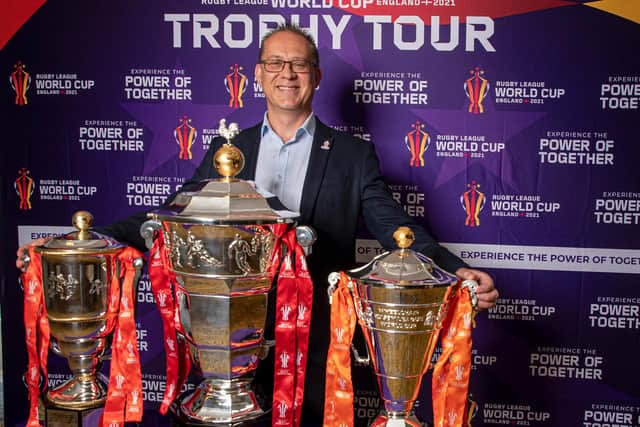World Cup chief Jon Dutton reacts to decision to ban transgender players
In announcing the move last week, the International Rugby League (IRL) said it had a “responsibility to balance the individual’s right to participate against perceived risk to other participants”.
The IRL will use the end-of-year tournament to conduct further research.
Advertisement
Hide AdAdvertisement
Hide AdIt said: “The IRL will seek to work with the eight Women’s Rugby League World Cup 2021 finalists to obtain data to inform a future transwomen inclusion policy in 2023, which takes into consideration the unique characteristics of rugby league.”


The decision came after FINA, swimming’s world governing body, voted to stop transgender competitors from taking part in women’s races if they have gone through part of male puberty.
Transgender women have already been banned from playing at elite level by rugby union’s governing body World Rugby.
World Athletics president Lord Coe has hinted track and field could follow that lead by banning transgender athletes from elite competition.
Advertisement
Hide AdAdvertisement
Hide AdThe IRL said its decision was influenced by “several relevant developments in world sport”, including a conclusion from the International Olympic Committee that it was up to each individual sport to weigh up “how an athlete may be at a disproportionate advantage compared with their peers”.
Dutton, who is returning home after completing a two-week promotional visit Down Under, has backed the governing body’s clear stance with the start of the World Cup just over 100 days away.
“It’s very much a matter for the international federation,” Dutton told The Yorkshire Post.
“We have welcomed the clarity that has been provided now to athletes and nations in preparation for the tournament.
Advertisement
Hide AdAdvertisement
Hide Ad“Our understanding is that it is an interim decision. I think more scientific research needs to be taken in terms of the impact and we will willingly allow the international federation to undertake that during the tournament.
“For us, it’s a very difficult, sensitive, emotive subject - but we welcome the clarity. What we didn’t want to happen was any athlete turning up and then subsequently not being allowed to play in the tournament.
“This helps all nations with preparation, whatever the permanent decision is post-tournament.”